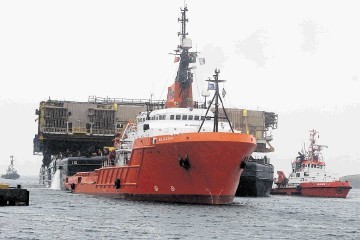
After more than 20 months of engagement and collaboration between industry and the Government, December 11 saw a further milestone reached in the almost Herculean effort to enable decommissioning security arrangements to move to a post-tax basis.
That day, Westminster published the draft Finance Act 2013 clauses which will provide the statutory framework for Government to sign contracts with companies operating in the UK and on the UK Continental Shelf, to provide assurance on the tax relief they will receive when decommissioning assets.
The full suite of documents included:
o The Government’s response to the comments from industry on the earlier consultation.
o Draft law to enable the Government to make payments under Decommissioning Relief Deeds (“DRDs”).
o Draft law to make various technical amendments to the existing tax legislation.
o An explanatory memorandum for the draft legislative clauses.
o The Government’s draft DRD, which will be standard across all companies.
Significantly, the Government has accepted many of the recommendations of Oil & Gas UK and identified the few (but important) areas where further discussion is needed.
As advisers begin to pour over the 46 pages of legislation and guidance, and the 130 pages containing the draft DRD and the Government’s detailed response to industry’s representations, the Coalition has made it clear that it intends to continue the intensive level of engagement with industry which characterised the first period of consultation.
It remains open to discussion and has announced a second period of consultation starting immediately and ending on February 6 to ensure the new DRD regime is ready to be implemented in Finance Act 2013.
Many proposals are broadly in line with industry expectations including:
o Introduction of legislation to provide the ability for Government to make payments under the DRDs;
o Broadly, the scope of what constitutes allowable decommissioning expenditure has been expanded to include various items that are currently excluded, including onshore facilities servicing offshore fields.
o The removal of the burden of inheritance tax from decommissioning trusts (applying retrospectively back to 1993).
o A statutory exception to taxpayer confidentiality in order to allow HMRC to provide petroleum revenue tax (“PRT”) information so those entering into DRDs can calculate the level of PRT relief that is generated by the DRD.
o Compensation for any loss if Government obligations under DRDs are transferred and the DRD ultimately becomes unenforceable.
However, there are still several outstanding areas that require attention.
Anti-avoidance
Whilst the Government has listened to many of industry’s concerns around the inclusion of “anti-avoidance” rules in the tax legislation and the DRD, concern remains that the anti-avoidance proposals are too broadly drawn and could undermine certainty.
In particular, the Government’s response does not indicate that the General Anti Abuse Rule (also scheduled to be introduced in Finance Act 2013 as part of the Government’s measures to counter abusive tax planning) will be specifically “disapplied” in the DRD for the purposes of claiming “Imposed” expenditure (imposed upon default).
Moreover, the DRD now contains embedded anti-abuse sanctions which link to the Disclosure of Tax Avoidance Schemes (DOTAS). The DOTAS rules are designed to immediately disclose to HMRC any tax planning arrangements which have the hallmarks of avoidance, to enable such arrangements to be countered by appropriate legislation.
As such the rules are broadly drawn and likely to be inappropriate when used in this context, perhaps undermining certainty over the DRD payments.
The Government is aware of this risk and in the detailed response to industry’s representation has stated that the intention of these provisions is that they will only apply where an avoidance transaction is implemented; where such avoidance is specifically countered; and then only to the extent that the claim under the DRD has exceeded that which would have been made had the avoidance not taken place. Whilst this is reassuring work is required to ensure the specific provisions mirror the stated intent in this area.
Income tax
While Inheritance Tax will be dealt with, income earned by a decommissioning trust will remain subject to the top rate of from income tax (currently 50%, reducing to 45% on April 6, 2012). It is inappropriate that if such trusts are subject to income tax that the rate should be that applied to trusts being utilised as wealth planning vehicles. Further representation will be made by industry that the rate of income tax that applies should be no more than the basic rate.
Onshore facilities
It is a welcome change to the general scope of decommissioning that those onshore facilities which relate to offshore fields will now qualify for the special allowances which apply to these fields.
However, onshore decommissioning in general has not been included within scope of the special decommissioning regime, albeit that the Government has already announced it is re-considering the onshore regime for hydrocarbon extraction in the light of potential shale gas development.
Next steps
In January consultation workshops will be held with three groups to consider the following matters:
o Timing and processes: how the DRD works and the mechanics of its operation
o Anti-abuse: the inclusion of a targeted anti-abuse rule to cover the operation of the DRD
o Reaction to the DRD and commercial practices: responding to the details of both the enabling legislation as well as the detailed drafting of the Deed.
Hopefully, these final efforts will fine tune the legislative provisions and the DRD to deliver a package of measures which will meet the objective, and be a credit to OGUK who have led the work, and both industry and HMT/HMRC who have worked so effectively to tackle a very difficult issue.
Derek Leith is senior partner at Ernst & Young in Aberdeen